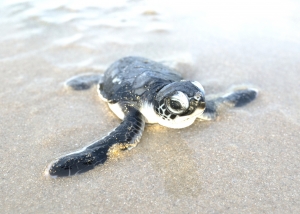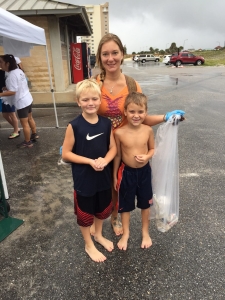Going Green Tips
Small choices every day make a big difference in reducing your carbon footprint. Leave Only Footprints challenges you to implement these simple green practices into your life. From drinking coffee to taking out the trash, it doesn’t have to be difficult or expensive to go green.
Trash & Recycling Centers
Curbside Recycling
Gulf Shores
The City of Gulf Shores contracts with Republic Services to provide weekly residential recycling services. Recycling pickup days are on Wednesdays and Thursday.
Orange Beach
Orange Beach curbside recycling is collected each Wednesday using a two-zone system. Each participating residence receives service biweekly.
Any non-recyclable items placed in your curbside recycling bins will be sent to the landfill at the cost of the city. So be sure to check with the City of Gulf Shores or the City of Orange Beach to learn which products are recyclable.
Bulk Recycling
Community Recycle Stations are available for bulk disposal of paper/cardboard, plastics and aluminum. Locations are:

Share the Beach: Be Sea Turtle Friendly
Each year, between May and October, thousands of endangered sea turtles are hatched on the beaches of Gulf Shores and Orange Beach. This is also when thousands of families plan their annual vacations on Alabama’s white-sand beaches.
During sea turtle nesting and hatching season, you may be fortunate enough to witness a nest boil. This is when dozens (hopefully hundreds) of hatchlings erupt from the sand and make their way to the Gulf of Mexico. Generally, you’ll see Share the Beach volunteers cording off the area and assisting any straying turtles. These volunteers are trained and educated on how to properly handle and care for our nesting neighbors. If you witness a boil or spot a sea turtle nest, Share The Beach asks that you not disturb the area, but encourages you to enjoy this rare event through observation.
Please follow these guidelines during sea turtle nesting season to ensure the greatest chance of survival for our underwater friends:
Dolphin SMART
Dolphins are hunters, not beggars. But when people offer them food, they quickly learn begging behavior and lose their fear of humans, resulting in injuries to the dolphin from contact with vessels and from loss of survival skills.
For these reasons, the Marine Mammal Protection Act prohibits harassment, hunting, capturing, killing or feeding dolphins. Be Dolphin SMART by following these guidelines:
Alabama Coastal Cleanup
What are you doing the third Saturday of next September? Think clean and green. Join thousands of volunteers across the world serving together for “trash-free seas” on International Coastal Cleanup Day, including a team in Gulf Shores and Orange Beach. Let’s leave only footprints together.
It’s easy to volunteer. Whether you’re volunteering as an individual or bringing a group of scouts, a youth group or co-workers, everyone is welcome and encouraged to get the trash out of the splash. Numerous cleanup zones are set up and each one has a team captain. Contact a captain to lend a hand and keep our coastlines clean.
Alabama Coastal Cleanup Quick Stats:


Marine Debris
Marine debris takes many forms, including litter, derelict fishing gear and abandoned recreational equipment. Countless consumer items make their way into our Gulf waters each season, creating trash in our marinas, waterways and estuaries as well as on our beaches.
The consequences of marine debris are many, including:
Marine debris can impact a large variety of marine life, from small microorganisms to the largest of whales. Animals may inadvertently eat debris or become entangled in it. Plastic bags, for example, are a common threat to our endangered sea turtles, which often mistake them for a common food item —jellyfish.
Take action against marine debris:

Photo Credit: Ocean Conservancy


